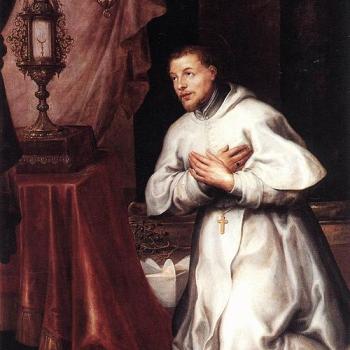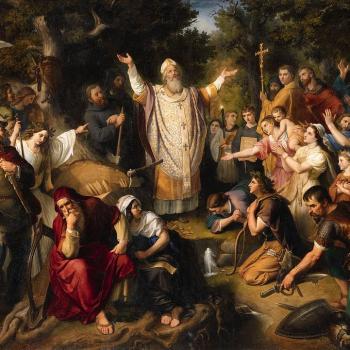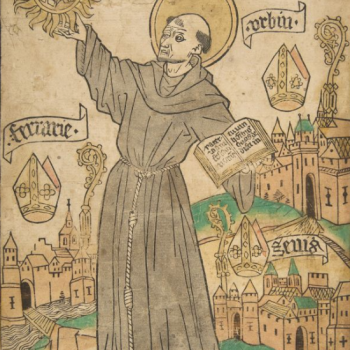My history professor at North Park, Phil Anderson, is rather keen on quoting Blaise Pascal’s famous adage, “the heart has reasons that reason knows nothing about.” This saying illustrates beautifully the tension between the philosophy of the Enlightenment and the actual experiences of individuals. This dichotomy of dispositions, although always abiding within the human person, was most dramatically thrown into tension around the time of Pascel.
Pascel was writing at a time where reason was ascendant amongst academians, and “heart religion” was caliph of the common. He lived in the seventeenth century; a time in which the young Modern Era was coming of age, and the forces of head and heart were beginning to tear open the wine-skins of Protestant confessional religion (born just a generation before). The rending that was beginning take place would eventually change the way people saw the world, and themselves forever.

. That assumption had crumbled in many ways in the Sixteenth century. As people began to return to the earliest sources of sacred texts they found that, in some cases, Catholic tradition seemed to contradict what was being said. Reformers like Martin Luther, and John Calvin took a stand on the Bible over and against tradition and the reformation was born.

is the basis for doctrine, who had the authority to interpret it. People could make the Bible say just about anything they wanted. The solution that many in the reformation came up with was confessions. Confessions are documents that set parameters on what is right and wrong thinking. The solution held for a while, but soon it became clear that it wouldn’t solve the issue of authority.

. The first is that there is not enough room for the individual experience. The second is that there is no rational reason to set the boundaries on the confessions where they are set. Out of these two dangers came two movements that would inform nearly all of the western cultural landscape for centuries: the evangelical awakenings and the enlightenment.
The first danger manifested itself as a problem early on in the life of the church. Confessional Christianity had an inability to speak to a persons particular anxieties and experiences. Faith was communicated as a set of confessions one can intellectually assent to about who God is and how he operates. Those confession however created a great deal of anxiety among people about they worked out in their lives. People began to ask questions:

Does faith alone mean people are not challenged to live the Christian life?
Is my life good enough?
Is there a way for me to encounter God himself?
Confessional theology tried to explain how God worked, but left little room for adressing the real concerns of real people at that time. Out of the silence of confessionalism, and from the anxieties caused by reformation theology, something new emerged.

, began to meet in homes in an attempt to bring the life of the Sunday liturgy more into their lives. In England protestants who sought after a life more affected by the Gospel called for a more radical reformation. These folks were called Puritans. As the message of these group
s, and many more groups like them began to spread. Charismatic leaders, like John Wesley, began to be touched by God in a personal way, and began to preach the need for the Gospel to individuals.

The desire to bring the Gospel more fully into peoples lives was not limited to only spiritual awakenings in new ways of meeting and preaching. It also helped birth new ways of thinking. In the Danish city of Copenhagen a young philosopher named Søren Kierkegård began writing about Christianity in a way that flew in the face of Confessional Christendom. He proclaimed the price of admission to Christianity was not right belief, but blood. If faith is not a martyrdom, he declared, it is a sham. As you can imagine his writings ruffled a few feathers, which in many ways was his aim. However Kierkegård’s
main target was not the church, but the philosophy of a man named G.W.F. Hegel
.
Hegel was a philosopher who was part of a movement historians call the Enlightenment. Hegel believed that reason should help people navigate through the dialectical vicissitudes of history and theology. The problem that enlightenment thinkers, like Hegel, had with Confessions was not that they relied to strongly on reason, like the evangelicals in the awakenings. The problem early enlightenment thinkers had was that the confessions limited the free reign of Science, and Reason. This was the problem that emerged from the second “danger” previously stated. For early enlightenment thinkers, the rational and empirical were seen as the only reliable sources by which the world might hope to be deciphered, the main question for Enlightenment thinkers quickly moved away from discussions on who has the authority to interpret the Bible. They now were concerned with what human faculty can attain truth. Where the people of the awakenings saught a personal connection with God apart from intellection, the enlightenment thinkers sought personal intellection apart from God.

trusted, others argued reason. A philosopher named Immanuel Kant came on the scene are demonstrated both were needed. This showed that comprehendible truth was partially dependent on experience. Truth became more and more subjective.
In the mean time the Evangelicals continued to experience awakening after awakening. However each awakening brought new perspectives on God. Soon the Protestant church was divided along every possible doctrinal, cultural, and biblical dispute anyone could think of.
The Confessionalism of early Protestantism was intended to create a frame of reference in which people could discern the authority of the Bible in their lives. However once authority was up for grabs, everyone got their own piece of it. Without a common authority, there is no grounds for common truth. Today we are left in a world that views truth in an increasingly subjective way. In the Church a personal relationship with God has become more important then the community of God. In philosophy people have rejected the modern notion that truth can be found at all; any truth claim is only subjectively relevant. The West has given up it’s common life, we are now simply millions of people in different worlds, but living in the same space.

made himself the first object of study, he would see how incapable he is of going further. How can a part know the whole?” We sought to explain how God worked, but came to the coclusion that we don’t even know how a mere human worked. Perhaps if we get back to why God worked we can once again take hold of a world together. How God works we can never know, but why was made clear. God so loved the world.















